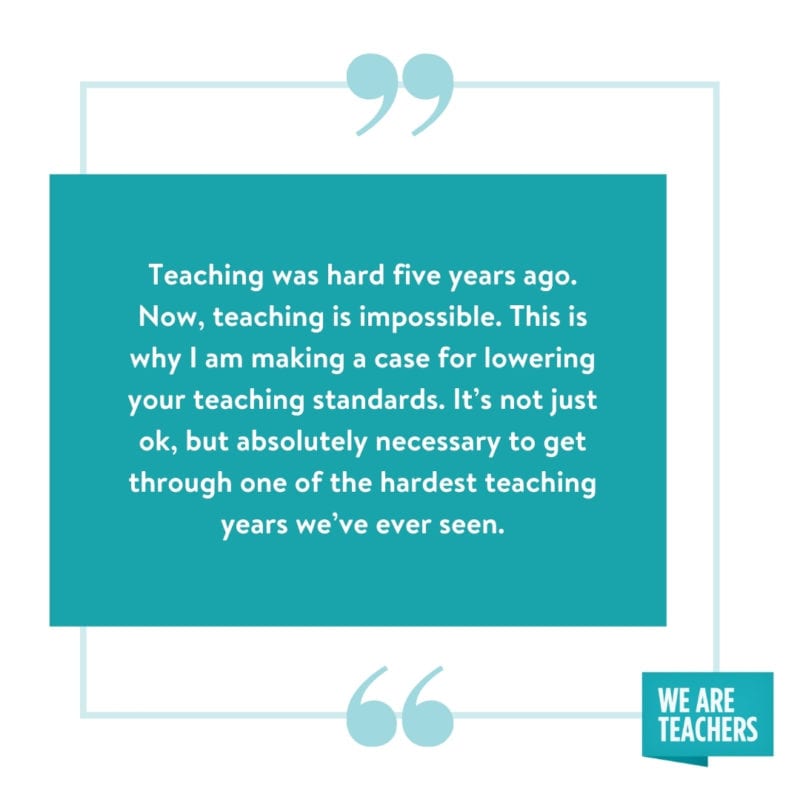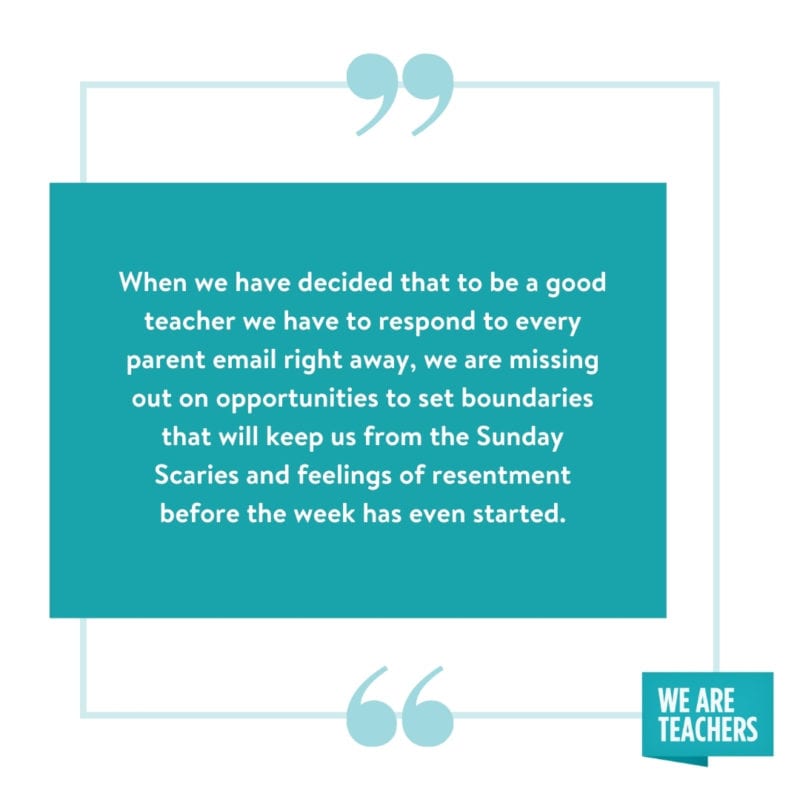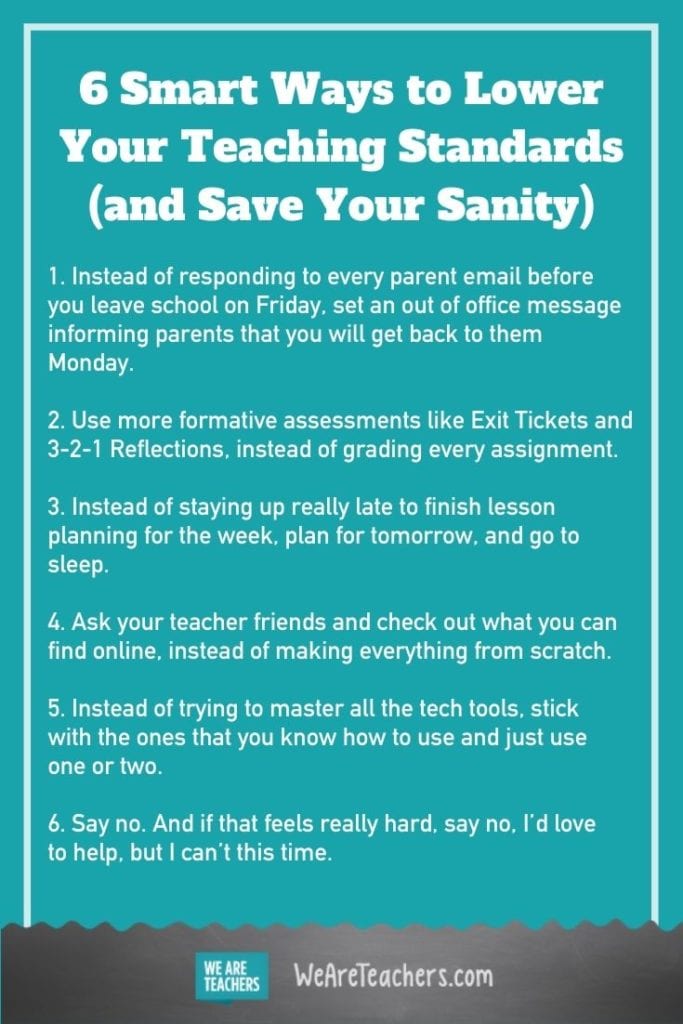Most of the time, I was an overachiever teacher. My day-to-day was a hustle starting with an alarm that went off at 5 a.m. (gotta get that morning workout in and the kids to daycare!) and ending at 11 p.m. when I finally stopped working. Then, inevitably, and usually the last few days of school before a break, I’d get sick. Then I was the “fly by the seat of my pants” teacher, doing the bare minimum but still showing up with more worksheets than usual and a bad cold. I never felt good. I either felt great or terrible.
Teaching the way I thought I needed to took so much out of me that I couldn’t sustain it. I knew that if I could just find a happy medium that I’d be a happier (and healthier) teacher, but there was just too much to do (after all … 150 essays don’t grade themselves). I felt so much pressure to show up to school, smiling and full of energy with a detailed set of lesson plans for the week ready to go and an empty inbox.
The only person demanding such high standards was me
It never occurred to me to consider where these standards came from. My teacher friends weren’t telling me that I needed to get all my grading and planning done before I could relax and watch Netflix. My principal didn’t tell me to join the curriculum committee and proctor the SATs; she asked me to. I could have said no, but I didn’t. There was never an administrator, colleagues, parent, or student who told me I needed to do these things. The only person who was demanding such high standards was me.
As I coach teachers this year, I have so much compassion for the trauma, stress, and anxiety they are experiencing. Teaching was hard five years ago. Now, teaching is impossible. This is why I am making a case for lowering your teaching standards. It’s not just OK, but absolutely necessary to get through one of the hardest teaching years we’ve ever seen.

It’s more than OK to put your mental and physical health first
Lowering your standards doesn’t mean being lazy or giving up. You adjust your expectations and adapt, and break the cycle of all or nothing. Rather than teaching at the top or teaching at the bottom, you teach in the middle.
At first, it feels pretty uncomfortable. For some of us, planning, preparation, and staying on top of everything helps us feel in control. If you are someone who has been feeling especially anxious this year, getting things done feels comforting. I’m right there with you. But as a recovering overachiever and perfectionist, I’m here to remind you that you are human. Lowering your teaching standards isn’t a sign that your life is spiraling out of control. It’s an absolutely necessary way to focus on what is most important right now: your physical and mental health.
[contextly_auto_sidebar]
Change your mindset to get out of the all or nothing cycle
So how do you start lowering your teaching standards? It starts with your mindset. You’re probably familiar with Carol Dweck’s Growth and Fixed Mindsets. When we have a fixed mindset, there’s little to no opportunity for growth. If we tell ourselves, I can’t call my friend until I finish all of my grading, then we are missing out on how much better we might feel if we take a break while grading to connect with a friend. When we have decided that to be a good teacher we have to respond to every parent email right away, we are missing out on opportunities to set boundaries that will keep us from the Sunday Scaries and feelings of resentment before the week has even started.

Talk to yourself the way you talk to your students
To get started, talk to yourself differently. The way we talk to ourselves matters because the person who is most critical of you is you. The standard of teaching that you’ve decided is the only standard isn’t sustainable, and no one is forcing you to meet it but you. It’s not that you are going to stop doing everything that you’ve always done. It’s that you are going to reconsider why you are trying to teach the way you have always taught during a time where your teaching situation has never been more different.
Listen to your body; chances are it is trying to tell you something
Something else you can do to prevent the all or nothing cycle is to stay in tune with your body. Do you feel tense? Are your shoulders permanently attached to your ears? Are you taking deep breaths? Did you get outside today? Are you moving your body? I used to think meditations were silly, but I’ve learned the hard way that five minutes of breathing, writing down affirmations and mantras, and stretching really can make a difference.
Here’s what lowering your teaching standards might look like:
Instead of responding to every parent email before you leave school on Friday, set an out of office message informing parents that you will get back to them Monday.
Use more formative assessments like Exit Tickets and 3-2-1 Reflections instead of grading every assignment.
Instead of staying up really late to finish lesson planning for the week, plan for tomorrow, and go to sleep.
Ask your teacher friends and search for materials online instead of making everything from scratch.
Instead of trying to master all the tech tools, stick with the ones that you know how to use and just use one or two.
Say no. And if that feels really hard, say no, I’d love to help, but I can’t this time.
How are you lowering your standards this year? Share in the comments! Plus, get more teacher stories and tips by subscribing to our newsletter.
Also: 16 Teachers Share How They Are Creating Boundaries Right Now

Why Lowering Your Teaching Standards Is Not Only Okay, But Necessary

